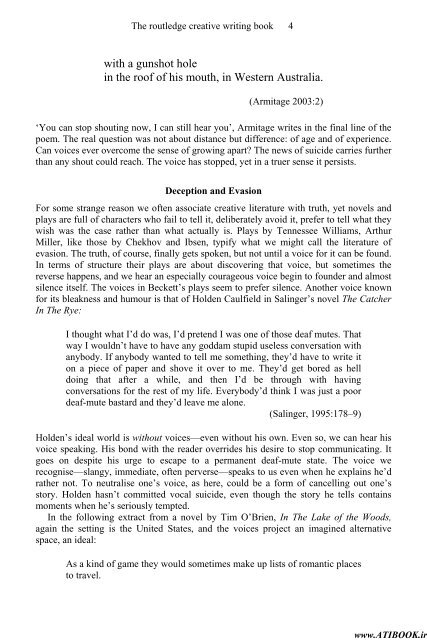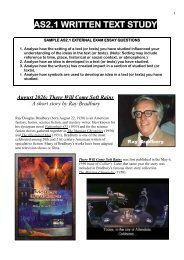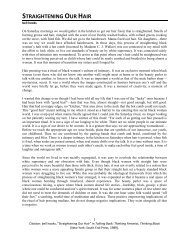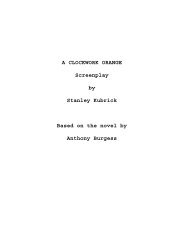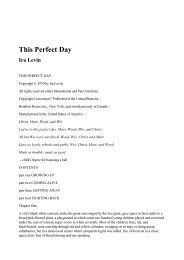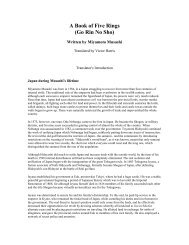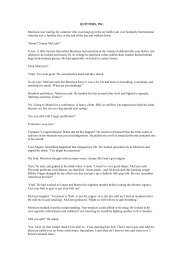9780415317856_the_routledge_creative_writing_coursebook
9780415317856_the_routledge_creative_writing_coursebook
9780415317856_the_routledge_creative_writing_coursebook
Create successful ePaper yourself
Turn your PDF publications into a flip-book with our unique Google optimized e-Paper software.
www.ATIBOOK.irThe <strong>routledge</strong> <strong>creative</strong> <strong>writing</strong> book 4with a gunshot holein <strong>the</strong> roof of his mouth, in Western Australia.(Armitage 2003:2)‘You can stop shouting now, I can still hear you’, Armitage writes in <strong>the</strong> final line of <strong>the</strong>poem. The real question was not about distance but difference: of age and of experience.Can voices ever overcome <strong>the</strong> sense of growing apart? The news of suicide carries fur<strong>the</strong>rthan any shout could reach. The voice has stopped, yet in a truer sense it persists.Deception and EvasionFor some strange reason we often associate <strong>creative</strong> literature with truth, yet novels andplays are full of characters who fail to tell it, deliberately avoid it, prefer to tell what <strong>the</strong>ywish was <strong>the</strong> case ra<strong>the</strong>r than what actually is. Plays by Tennessee Williams, ArthurMiller, like those by Chekhov and Ibsen, typify what we might call <strong>the</strong> literature ofevasion. The truth, of course, finally gets spoken, but not until a voice for it can be found.In terms of structure <strong>the</strong>ir plays are about discovering that voice, but sometimes <strong>the</strong>reverse happens, and we hear an especially courageous voice begin to founder and almostsilence itself. The voices in Beckett’s plays seem to prefer silence. Ano<strong>the</strong>r voice knownfor its bleakness and humour is that of Holden Caulfield in Salinger’s novel The CatcherIn The Rye:I thought what I’d do was, I’d pretend I was one of those deaf mutes. Thatway I wouldn’t have to have any goddam stupid useless conversation withanybody. If anybody wanted to tell me something, <strong>the</strong>y’d have to write iton a piece of paper and shove it over to me. They’d get bored as helldoing that after a while, and <strong>the</strong>n I’d be through with havingconversations for <strong>the</strong> rest of my life. Everybody’d think I was just a poordeaf-mute bastard and <strong>the</strong>y’d leave me alone.(Salinger, 1995:178–9)Holden’s ideal world is without voices—even without his own. Even so, we can hear hisvoice speaking. His bond with <strong>the</strong> reader overrides his desire to stop communicating. Itgoes on despite his urge to escape to a permanent deaf-mute state. The voice werecognise—slangy, immediate, often perverse—speaks to us even when he explains he’dra<strong>the</strong>r not. To neutralise one’s voice, as here, could be a form of cancelling out one’sstory. Holden hasn’t committed vocal suicide, even though <strong>the</strong> story he tells containsmoments when he’s seriously tempted.In <strong>the</strong> following extract from a novel by Tim O’Brien, In The Lake of <strong>the</strong> Woods,again <strong>the</strong> setting is <strong>the</strong> United States, and <strong>the</strong> voices project an imagined alternativespace, an ideal:As a kind of game <strong>the</strong>y would sometimes make up lists of romantic placesto travel.


